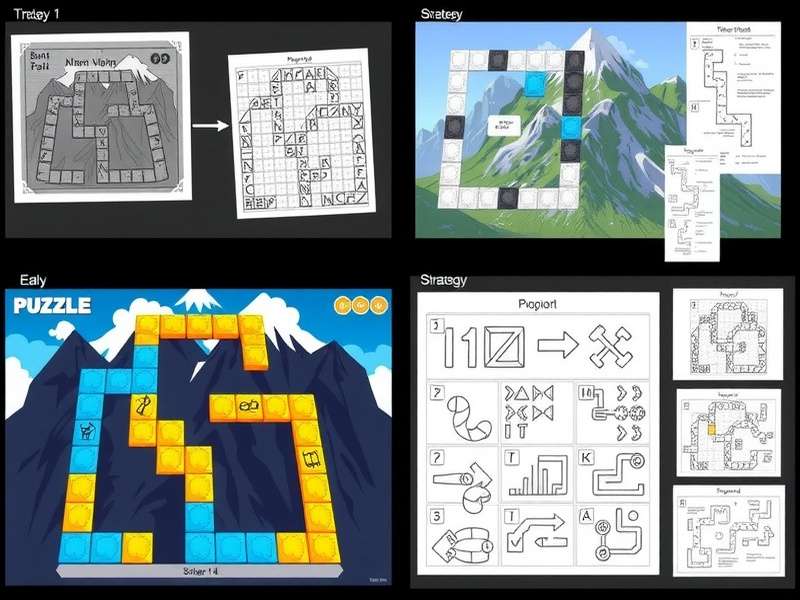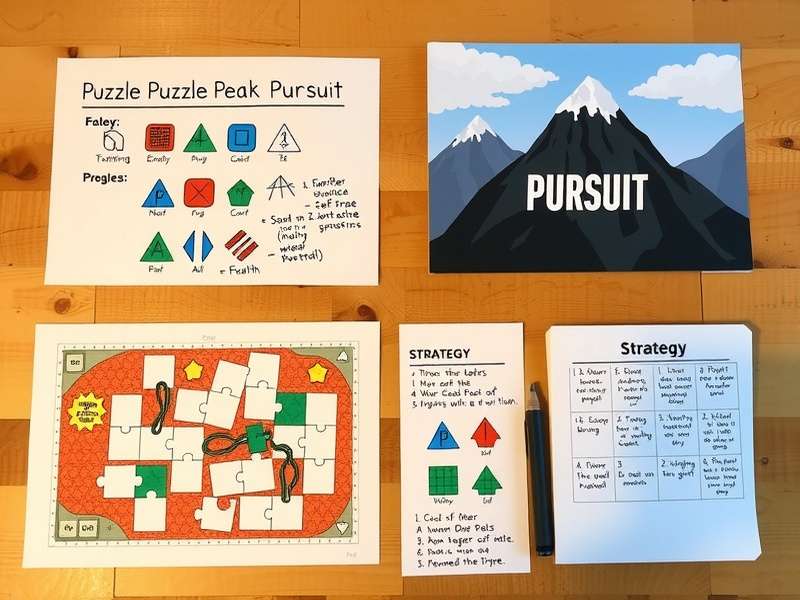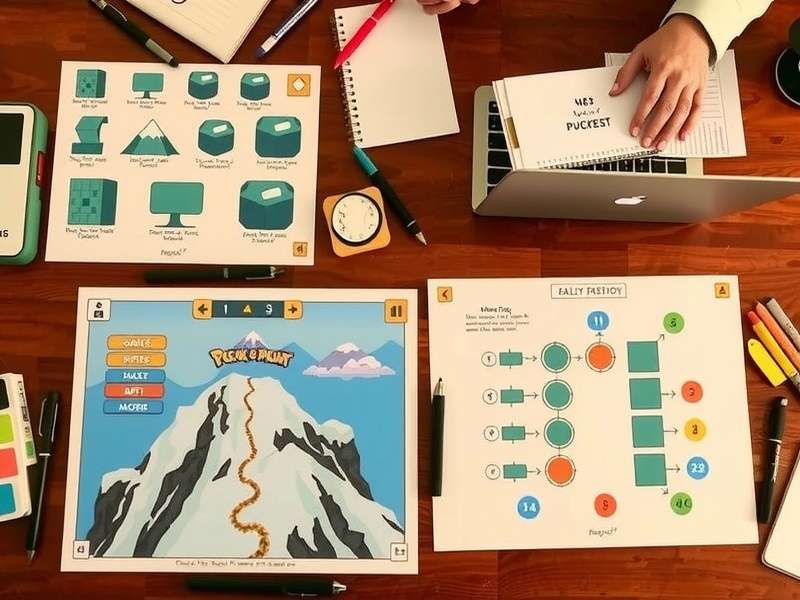Puzzle Peak Pursuit: The Ultimate Indian Mind Challenge 🧠🏔️
Puzzle Peak Pursuit represents India's most innovative contribution to the world of intellectual games, combining traditional puzzle-solving with modern strategic elements in a uniquely challenging format.
Quick Facts:Puzzle Peak Pursuit was invented in Mumbai in 2012 • Over 5 million active players worldwide • Recognized as an official mind sport in India since 2018 • Featured in international puzzle championships since 2020
Overview of Puzzle Peak Pursuit 🌟
Puzzle Peak Pursuit stands as a monumental achievement in the realm of cognitive games, blending mathematical precision with creative problem-solving. This game challenges players to navigate increasingly complex puzzles arranged in a mountain-like hierarchy, where each solved puzzle brings them closer to the symbolic peak.
The fundamental appeal of Puzzle Peak Pursuit lies in its elegant simplicity masking profound complexity. New players can grasp the basic mechanics within minutes, yet mastery requires years of dedicated practice and strategic thinking. This accessibility combined with depth has contributed significantly to its widespread popularity across India and beyond.
Cognitive Benefits
Regular engagement with Puzzle Peak Pursuit has been shown to enhance multiple cognitive domains including working memory, pattern recognition, logical reasoning, and creative problem-solving. Educational institutions across India have begun incorporating elements of the game into their curriculum to develop these essential skills in students.
Unlike many puzzle games that focus on a single type of challenge, Puzzle Peak Pursuit incorporates diverse puzzle formats including spatial reasoning tasks, numerical sequences, linguistic puzzles, and logical deductions. This variety ensures comprehensive mental stimulation and prevents player fatigue from repetitive challenges.
The social dimension of Puzzle Peak Pursuit cannot be overstated. While fundamentally an individual challenge, the game has spawned vibrant communities where players share strategies, celebrate breakthroughs, and support each other's journey toward mastery. This community aspect has been particularly important in maintaining player engagement over time.
Historical Development of Puzzle Peak Pursuit 📜
The origins of Puzzle Peak Pursuit trace back to Mumbai in 2012, when software engineer Arjun Mehta sought to create a game that would honor India's rich tradition of mathematical and logical puzzles while incorporating contemporary design principles. Mehta's initial concept underwent numerous iterations based on feedback from early testers.
By 2014, Puzzle Peak Pursuit had gained a dedicated following in academic circles, particularly among mathematics and computer science students who appreciated its rigorous logical framework. The game's first major breakthrough came when it was featured at the Indian Science Congress in 2015, attracting attention from educators and cognitive scientists.

The period from 2016 to 2018 marked significant maturation for Puzzle Peak Pursuit. The rules were formalized, a standardized scoring system was implemented, and the first official tournaments were organized. In 2018, the game received formal recognition as an official mind sport by the Indian Mind Sports Association, cementing its status in the competitive puzzle landscape.
International expansion began in earnest in 2019, with Puzzle Peak Pursuit demonstrations at global puzzle conventions and the establishment of official international chapters. The COVID-19 pandemic unexpectedly accelerated this growth as people sought engaging intellectual activities during lockdowns, leading to a 300% increase in registered players between 2020 and 2022.
Competitive Milestones
The first national Puzzle Peak Pursuit championship was held in New Delhi in 2017 with 128 participants. By 2022, the championship had expanded to include over 2,000 qualifiers from across India, with the finals broadcast to an audience of millions. International competitions began in 2021 and now feature participants from over 40 countries.
Recent developments in Puzzle Peak Pursuit have focused on digital adaptation while preserving the core intellectual challenges. The official mobile application launched in 2021 has introduced the game to millions of new players while maintaining the strategic depth that defines the physical version. This digital expansion has particularly resonated with younger demographics.
Gameplay Mechanics and Rules 🎮
At its core, Puzzle Peak Pursuit challenges players to solve a series of interconnected puzzles arranged in seven tiers, symbolically representing the ascent of a mountain. Each tier presents puzzles of increasing difficulty, with the seventh tier containing the most complex challenges collectively known as the "Summit Puzzles."
The game begins with players receiving a starting kit containing the foundational puzzles of the first tier. These initial puzzles are designed to introduce core concepts while being accessible to newcomers. Successfully solving all puzzles in a tier unlocks access to the next tier, with players tracking their progress on a symbolic mountain map included with the game.
Puzzle Varieties
Puzzle Peak Pursuit incorporates twelve distinct puzzle types distributed across the seven tiers: Logic Grids, Sequence Completion, Spatial Rotation, Cryptographic Substitution, Pattern Recognition, Mathematical Equations, Word Association, Visual Synthesis, Deductive Reasoning, Probability Challenges, Memory Sequences, and Creative Problem-Solving. This diversity ensures comprehensive cognitive engagement.
Scoring in Puzzle Peak Pursuit follows a sophisticated system that rewards both accuracy and efficiency. Players earn base points for correct solutions, with bonus points awarded for speed and elegance of solution. The scoring algorithm also incorporates difficulty multipliers, making higher-tier puzzles potentially worth significantly more points than lower-tier ones.

Time management represents a crucial strategic element in Puzzle Peak Pursuit. While there are no strict time limits for individual puzzles in casual play, tournament settings impose reasonable time constraints to increase competitive pressure. Players must develop an intuitive sense of when to persist with a challenging puzzle versus when to temporarily skip ahead and return later.
The social dynamics of Puzzle Peak Pursuit gameplay deserve special mention. While primarily an individual endeavor, the game incorporates optional collaborative elements where players can form "climbing parties" to tackle particularly difficult tiers together. This feature has proven especially popular in educational settings and corporate team-building exercises.
Advanced gameplay introduces special modifiers and conditions that can dramatically alter puzzle-solving approaches. These include "Fog of War" conditions where incomplete information must be worked with, "Time Vortex" scenarios with fluctuating time constraints, and "Mirror Mode" where solutions must be inverted or reflected. These variants keep the game fresh for experienced players.
Advanced Strategies and Techniques 🏆
Mastering Puzzle Peak Pursuit requires developing a diverse toolkit of solving strategies tailored to different puzzle types. Novice players typically rely on trial-and-error approaches, but experts employ systematic methods that dramatically improve both accuracy and speed.
Pattern recognition forms the foundation of advanced Puzzle Peak Pursuit strategy. Expert players develop an almost intuitive ability to identify underlying patterns across different puzzle types, allowing them to bypass laborious step-by-step analysis in favor of more efficient solution pathways. This skill develops through extensive practice and careful analysis of solved puzzles.
Mental Preparation
Elite Puzzle Peak Pursuit competitors emphasize the importance of mental preparation before important sessions. Techniques include meditation to enhance focus, visualization exercises to mentally rehearse solving approaches, and cognitive warm-ups using simpler puzzles to activate relevant neural pathways. Proper rest and nutrition are also recognized as critical performance factors.
Time allocation strategy represents another crucial dimension of high-level play. With numerous puzzles to solve within limited timeframes in competitive settings, players must develop sophisticated approaches to budget their time across different puzzles. This includes quickly assessing puzzle difficulty, recognizing personal strengths and weaknesses, and knowing when to temporarily abandon a particularly challenging puzzle.
Meta-cognition—thinking about one's own thinking processes—separates expert players from intermediates. The best Puzzle Peak Pursuit competitors continuously monitor their problem-solving approaches, identifying inefficiencies and developing more effective mental frameworks. They maintain detailed logs of their solving sessions, analyzing patterns in their mistakes and breakthroughs.

Collaborative solving techniques have emerged as a powerful approach to particularly challenging tiers of Puzzle Peak Pursuit. While the game is fundamentally individual, top players often form study groups where they analyze difficult puzzles together, sharing insights and developing collective solution methodologies. This collaborative approach has led to several breakthrough solving techniques now used throughout the community.
The psychological dimension of Puzzle Peak Pursuit cannot be overlooked. Maintaining concentration through extended solving sessions, managing frustration when confronted with particularly stubborn puzzles, and cultivating patience for methodical analysis all contribute significantly to long-term success. Many players incorporate mindfulness practices specifically to enhance these psychological capacities.
Cultural Impact and Global Reach 🌍
The influence of Puzzle Peak Pursuit extends far beyond recreational puzzle-solving, having established itself as a significant cultural phenomenon within India and increasingly internationally. Its impact can be observed across multiple domains including education, cognitive research, and even corporate training methodologies.
Within India's educational landscape, Puzzle Peak Pursuit has been embraced as a tool for developing critical thinking skills. Over 500 schools have incorporated elements of the game into their mathematics and logic curricula, with studies showing measurable improvements in students' problem-solving abilities and mathematical reasoning. Several universities now offer elective courses focused specifically on Puzzle Peak Pursuit strategies and their applications.
Educational Adoption
The Maharashtra State Board of Education made history in 2021 by becoming the first Indian state education system to formally include Puzzle Peak Pursuit modules in its standard curriculum for grades 8-10. Early results show improved performance in mathematics and science subjects, with particular benefits for students who previously struggled with abstract reasoning tasks.
The corporate world has discovered value in Puzzle Peak Pursuit as well. Numerous Indian companies now use modified versions of the game in their recruitment processes, particularly for roles requiring strong analytical abilities. Additionally, corporate training programs have adapted Puzzle Peak Pursuit principles for team-building exercises aimed at enhancing collaborative problem-solving among employees.
From a research perspective, Puzzle Peak Pursuit has attracted attention from cognitive scientists and psychologists studying problem-solving and intelligence. Several published studies have used the game as a framework for investigating how people approach complex challenges, how expertise develops in domain-specific skills, and the neurological correlates of creative insight during puzzle resolution.
The global expansion of Puzzle Peak Pursuit represents a fascinating case study in cultural adaptation. While the core mechanics remain consistent internationally, local variations have emerged that reflect cultural differences in problem-solving approaches. Japanese players, for instance, have developed particularly efficient methods for spatial reasoning puzzles, while German players excel at systematic logical deduction approaches.
Looking toward the future, Puzzle Peak Pursuit continues to evolve. Digital platforms are expanding accessibility, artificial intelligence researchers are studying the game as a benchmark for computational problem-solving, and educational applications continue to grow. The upcoming international standardization of rules and tournament formats promises to further cement Puzzle Peak Pursuit's status as a premier global mind sport.
Future Vision:The developers of Puzzle Peak Pursuit envision a world where the game becomes as recognized for developing cognitive skills as physical sports are for developing physical fitness. Plans include expanded educational initiatives, international scholarship programs for promising young players, and continued refinement of the game based on player feedback and cognitive research.